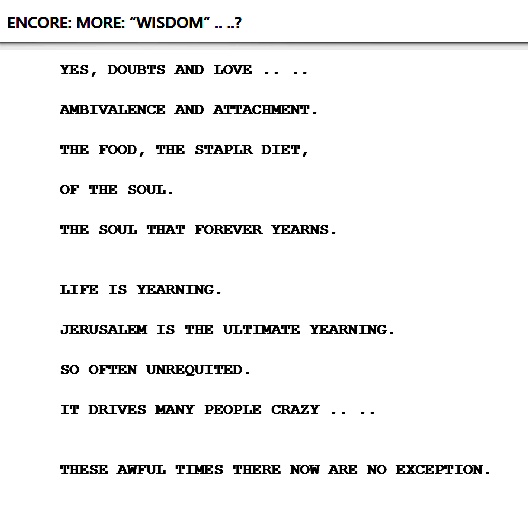Let me shock some with my opening video…
Yes, is Neil a goodie or a baddie? Is his hat white or black? Is he a closet Z—ist? Or a Pal—ne shill?
Shabbat with Congregation Beth El Bethesda, Maryland
On Facebook I tried to articulate where I stand right now…
In the hideous swamp the Levant so often seems — yet a place of great resilience and of many beautiful traditions that have shaped the entire world in so many ways — I acknowledge the suffering, yearn for true peace, and deplore so much of the leadership there over so much of my lifetime. I do not think any of the players there have incontestible primacy over anyone else. So I truly admire those who seek to make such a view real – the Hand in Hand: Center for Jewish-Arab Education in Israel for one, but there are many others. I think also of the West-Eastern Divan Orchestra begun by Daniel Barenboim and Edward Said.
I weep that such positives do not yet overcome the ultranationalism and bigotry that so infects too many minds, and the ideologies that contest for dominance rather than reconciliation.
In my own approach I acknowledge injustices, but am resolved not to be anyone’s propagandist or to play black/white goodies/baddies in this desperate situation.
Some of you will not agree with my approach.
But it is my authentic approach and here I stand.
DO watch on YouTube!
The Divan Orchestra founded by an Israeli and a Palestinian as a humanist project for friendship and dialogue is celebrating its 20th anniversary this year. Today, its young members are both Israeli and Arab. NewsHour Weekend Special Correspondent David Tereshchuk reports on the collaboration. (July 2020)
The ICC warrants are very defensible
You may even find that proposition in the Israeli press, as I did this very morning:
Yes, and note also the second story there. I know what she means…
One of the joys of my past twelve days has been the ongoing email exchanges with other members of the Sydney Boys High Class of 1959 as we process our 65 years since that final year of school. One I have mentioned often even before is Clive Kessler. I shared that poem with Clive, and he shared another Amichai poem right back, and mentioned the year he lived in Jerusalem, in that sad and beautiful part that Amichai evoked…
On Facebook I pinned where I normally would pin the latest blog post a link to Clive’s 1998 Nakba talk, which I have cited extracts from many times now. Clive said that year in Jerusalem was when he began to see things differently. He alludes to that, I feel, in the 1998 talk, which did not make Clive popular with some in the Jewish community.
From my relation to my grandparents, I formed some of my early understandings of history, politics and identity: ideas about the tragedy of a people’s loss of its independence and autonomy; about the pain of dispersion and the erosion of human dignity which it entails; about the vulnerability to which all stateless nations and their members are exposed in this modern world of ours. On that basis, I came to identify with and take a special pride in the achievements of the State of Israel, which in my own lifetime had accomplished such a dramatic reversal in the degraded condition of the Jewish people.
For a while, that framework of historical understanding sufficed and held firm for me. But not really for that long. One central component of the learning experience of my entire adult life has been my coming to terms with what, from the ashes of Jewish destruction, the creation of the State of Israel had entailed. Jews had indeed their ancient religious and spiritual connections with the Holy Land. Throughout their history, they had prayed for and dreamed of Jerusalem and made pious journeys and even returned to live in the Holy City, but the Holy Land was not empty and uninhabited.
The religious imagination and the land’s historical demography provided pictures which were far from identical. So the creation of the State of Israel had entailed the uprooting of some 450 Arab towns and villages and of 700,000 Palestinians. Alongside the Shoah – as its uncanny counterpart – the catastrophe of the Nakba, too, was a devastation and a disaster. By force, another dispersion, another diaspora, had been created.
I had wept to read of the destruction of the many Jewish communities, large and small, of Central and Eastern Europe, and was entitled to do so. Now I wept, too, to read of the expulsion, in 1948, of the Palestinians from Lydda and from Ramleh. I was entitled and also obliged to do so. This is not to equate Lydda and Ramleh in 1948 with the Warsaw Ghetto of 1943 – all such events are unique and, in some sense, incomparable – but we can find, and must recognize in them (despite their differences of time and place and circumstance), some common human themes, moral lessons and imperatives.
As new maps were drawn to reflect these newly created “facts on the ground” in Israel/Palestine, legitimization was incrementally given to processes for which the world has since coined the ominous and chillingly appropriate term “ethnic cleansing.” This process – of possession, of new map-creation, and of the framing and legitimization of new triumphalist, national narratives on the basis of those newly drawn maps, with all their renamed towns and villages – happened, not once, but twice (the immediate historical events don’t matter here) in 1948 and again in 1967.
Do take the time to read that whole article, even if it is in some respects dated. I really do think there are problems at this late stage with making a two state solution work, which I admit puts me out of step with the official current Australian position.
Meanwhile, those proposed warrants
I put it that way because the ICC warrants have not yet been put into effect. All we have is the prosecutor’s recommendation and request. Take the time to read it rather than all the blather about it.
And note too what the ICC actually is. It is NOT the International Court of Justice.
There is a lot of confusion about this. So instead of a blog post on Wednesday I highlighted this, confessing that I too have not always been clear in my own mind about the difference between ICC and ICJ.
What is the ICC?
Established in 2002, the ICC is an international court that has the ability to prosecute individuals accused of criminal conduct including genocide, crimes against humanity, war crimes, and aggression.
Unlike the International Court of Justice (ICJ), which is also based at The Hague and adjudicates the responsibility of states, the ICC does not indict a state or a people. In his video statement last week, Netanyahu said the ICC arrest warrants would “put Israel in the dock.” This view is wrong. ICC prosecutions are limited to questions of accountability of individuals for their own conduct alleged as crimes. The ICC will not indict the state of Israel or its citizenry.
From Can the ICC Actually Arrest Netanyahu? –– A former ICC president answers questions about the top court’s jurisdiction in the Israel-Hamas war.
In contrast to the guff coming from the likes of Peter Dutton and the pathetic double standards coming from the likes of Biden (the ICC was so lovely when it issued a warrant against Putin — and I by the way support that warrant too) here is an intelligent and well-informed British CONSERVATIVE response:
On the off-chance you have not guessed, I am very much in favour of the ICC warrants. I think a clear objective case exists for each one of them.
And those SBHS 65th emails…
A great 12 days! And maybe not quite over….




